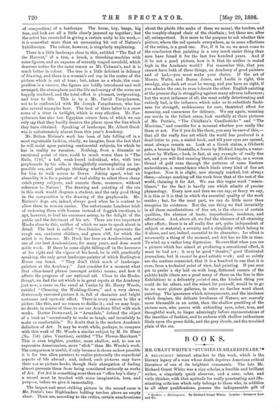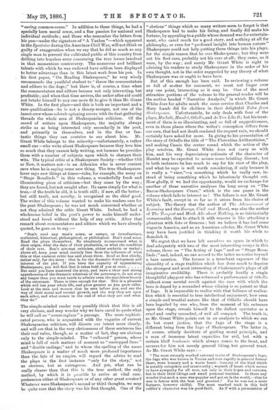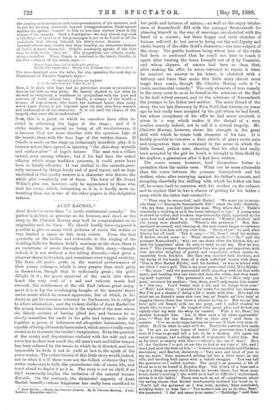BOOKS.
MR. GRANT WHITE'S "STUDIES IN SHAKESPEARE.", A MELANCHOLY interest attaches to this work, which is the literary legacy of a man whose death deprives American critical literature of one of its brightest ornaments. The late Mr. Richard Grant White was a ripe scholar, a forcible and brilliant writer, a singularly quick observer, and a sane, sober, and virile thinker, with that aptitude for really penetrating and illu- minating criticism which only belongs to those who, in addition to all other qualifications, possess the indispensable gift of • &mhos In Shakespeare. By Richard Grant White. London Sampson Low and Co.
"saving common-sense." In addition to these things, he had a specially keen moral sense, and a fine passion for national and individual rectitude ; and those who remember the letters from his pen—under the signature of "A Yankee "—which appeared in the Spectator during the American Civil War, will not think us guilty of exaggeration when we say that he did as much as any single man to prevent the cultivated public of this country from drifting into hopeless error concerning the true issues involved in that momentous controversy. The numerous and brilliant talents with which he was endowed have seldom been displayed to better advantage than in this latest work from his pen. In his first paper, "On Reading Shakespeare," he very wisely recommends the youthful student to throw the commentators and editors to the dogs ;" but there is, of course, a time when the commentators and editors become not only interesting, but profitable; and when that time arrives, the seeker after aid could not betake himself to any one more fit to give it than Mr. Grant White. In the first place—and this is both an important and a rare qualification—he is not a theory-monger, not one of the insect crew whose cobweb-spinning covers with its dust-gathering threads the whole area of Shakespearian criticism. Of the crowd of writers upon Shakespeare, the majority always strike us as being interested only secondarily in the poet, and primarily in themselves, and in the fine or fan- tastic things they can contrive to say about him. Mr. Grant White belongs to the minority—unfortunately, a rather small one —who write about Shakespeare because they love him so much that they cannot help writing, not because he provides them with a number of subjects upon which to sharpen their wits. The typical critic of a Shakespeare Society—whether Old or New, it matters not—is an Athenian who is never content save when he is saying some new thing. The true Shakespeare- lover says new things at times—take, for example, the essay on "Stage Rosalinds " in this volume, a wonderfully fresh and illuminating piece of criticism—bat they come by the way ; they are found, but not sought after. He cares simply for what is true,—if the truth be old, it is truth still ; if new, all the better ; but still truth, not novelty, is recognised as the chief good.
The writer of this volume wanted to make his readers care for the poet Shakespeare ; he was not much concerned whether or not they admired the critic Grant White. Indeed, be had a wholesome belief in the poet's power to make himself under- stood and loved without the help of any critic. After that remark about commentators and editors which we have already quoted, he goes on to say :—
"Don't read any man's notes, or essays, or introductions, mathetical, historical, philosophical, or philological. Don't read mine. Read the plays themselves. Be absolutely urconcerned what is their origin, what the date of their production, or what the condition of their text. Don't attempt criticism, either assthetic or verbal ; above all, keep your mind entirely free from the influence of what this or that eminent critic has said about them. Read at first chiefly, rather only, for the story : that is, for the dramatic development and interest of the plot. If you have the capacity of appreciating Shakespeare, you will find that it takes hold of you at once But until you have mastered the story, and have a clear and strong apprehension of the dramatic relations of the personages, do not stop any longer than you must needs to admire even the matchless beauty of the utterance. There is time enough for that. This is a pleasure which will last your whole life, and grow greater as yon grow older. Look at the men and women that he sets before yon, and see the way of their moral and mental growth, and the way they act upon each other, and what comes in the end of what they are and what they do."
The simple-minded reader may possibly think that this is all very obvious, and may wonder why we have cared to quote what he will call so "commonplace" a passage. The more sophisti- cated person, who is acquainted with the vagaries of current Shakespearian criticism, will discern our intent more clearly, and will see that in the very obviousness of these sentences lies their real value, though, as a matter of fact, they are obvious only to the simple-minded. The " cultured " person, whose mind is full of such matters of moment as "unstopped lines" and "double endings," and to whom the spelling of the name Shakespeare is a matter of much more profound importance than the fate of an empire, will regard the advice to read the plays in the first instance "only for the story," not as obvious, but as outrageous. And yet, what can be really clearer than that this is the true method, the only method, by which it is possible to arrive at vital com- prehension either of Shakespeare or of any other great creator ? Whatever were Shakespeare's second or third thoughts, we may be quite sure that the story was his first thought. One of the
"obvious" things which so many writers seem to forget is that Shakespeare had to make his living, and finally did make his fortune, by appealing to a public whose demand was for entertain- ment, who cared much for a good story, and nothing at all for philosophy, or even for "profound insight into human nature." Shakespeare could not help putting these things into his plays, for the simple reason that he was Shakespeare; but they were not his first care, probably not his care at all ; they came, as it were, by the way ; and surely Mr. Grant White is right in advising his readers to study Shakespeare in the order of his own thought, not in the order suggested by any theory of what Shakespeare was or ought to have been.
But of this enough has been said. In reviewing a volume so full of matter for comment, we must not linger over any one point, interebting as it may be. One of the most attractive portions of the volume to the general reader will be the section headed "Narrative Analysis," in which Mr. Grant White does for adults much the same service that Charles and Mary Lamb did for children in their delightful Tales from Shakespeare. Unfortunately, he only deals with four of the plays, Macbeth, Hamlet, Othello, and As You Like It; but his treat- ment of them is so illuminating, and so full of suggestiveness, even in those places where the writer's conception differs from our own, that had not death rendered the request vain, we should certainly have asked for more. In giving to his presentation of the story of Othello the title of "The Florentine Arithmetician," and making Cassio the centre round which the action of the play revolves, Mr. Grant White does not carry us with him, and his very depreciatory estimate of the character of Hamlet may be expected to arouse some bristling dissent ; but in both instances he has much to say for his view of the play, and what he says is well worth considering, if only because it is really a " view,"—a something which he really saw, in- stead of being something which he laboriously thought out. How gladly, it we had the opportunity, would we exchange for another of these narrative analyses the long essay on "The Bacon-Shakespeare Craze," which is the one paper in the volume which fails to interest us ! The failure is not Mr. Grant White's fault, except in so far as it arises from his choice of subject. The theory that the author of The Advancement of Learning and the Essays, Civil and Moral, was also the author of The Tempest and Much Ado about Nothing, is so intrinsically unreasonable, that to attack it with reasons is like attacking a phantom with fists or firearms ; but we believe it has had some vogue in America, and as an American scholar, Mr. Grant White may have been justified in thinking it worth his while to demolish it.
We regret that we have left ourselves no space in which to deal adequately with two of the most interesting essays in this volume, those on "The Acting of Ingo" and on "Stage Rosa. linds ;" and, indeed, we can accord to the latter no notice beyond a bare mention. The former is a trenchant exposure of the absurdity of a stage tradition which has done much to deprive the strongest and most interesting of :.hakespeare's plays of all imaginative credibility. There is probably hardly a single thoughtful playgoer who has witnessed a performance of Othello without some mental revolt against the ease with which the hero is duped by a scoundrel whose villainy is so patent as that of Iago. It is impossible to realise with that fullness of realisa- tion which is essential to true intellectual enjoyment, how even a simple and trustful nature like that of Othello should have been beguiled by one who, from the moment of his entrance upon the stage, reveals himself to the dullest spectator as a cruel and crafty scoundrel, of evil all compact. The truth is, as Mr. Grant White points out in an analysis to which we can do but scant justice, that the Iago of the stage is a different being from the Iago of Shakespeare. The latter is, of course, utterly destitute of guiding moral principle, and
a man of immense latent capacities for evil, but with a certain bluff bonhomie which always comes to the front, and
secures for him not merely general liking, but general trust. As Mr. Grant White says :—
" The most strongly marked external traits of Shakespeare's Iago, the Iago who was known in Venice and rose rapidly in general favour there, were honesty and a warm heart : honesty of the kind which is notably outspoken and trustworthy ; warmth of heart which seems to have sympathy for all men, not only in their hopes and sorrows, but in their little likings and small personal vanities. Is there any wonder that such a man was popular and got on in the world,—that he Was in favour with the best and greatest ? For he was not a mere flatterer, however skilful. The most marked trait in this bold soldier's character was his good-faith. As if with a premonition of
the coming misconception and misrepresentation of his creature, and to put his seeming character beyond misapprehension, Shakespeare applies the epithet honest' to him no less than sixteen times in the course of the tragedy. Such a description—we may almost say such a labelling—of another of his personages is not to be found in all the
multitude that throng through his thirty-seven dramas Lovingkindness was, hardly less than honesty, an attractive feature of Ingo's general character. Othello constantly speaks of the love that he finds in his ancient.' His sympathies are always ready, always manifest. When Cassie is involved in the brawl, Othello, in the first outburst of his wrath, says :—
Honest Lego. thou lool.'st dead with grienia2.
Steak, who began this P On thy love, I charge thee?—Act ii., Sc. 3.
The man deceived even his wife ; for she, speaking the next day to Desdemona of Cassio's disgrace, says,— • I warrant it grieves my husband A- if the case were his.'—Act iii., sc. 3.
Now, it is plain that Iago had no particular reason or occasion to deceive his wife on that point. He merely showed to her what he showed to everybody, a readiness to sympathise with the joys and sorrows of those around him. Emilia, a woman of the world, a woman of experiences, who knew her husband better than many wives know theirs, is yet imposed upon by this skin-deep warmth and surface-glow of his character. It is not until the climax of the tragedy that even she is undeceived."
Now, this is a point on which we ourselves have often in- sisted in criticising the Iagos of the stage ; and if it strike readers in general as being at all revolutionary, it is because they are more familiar with the spurious Iago of the boards, than with the true Iago of the written drama. If Othello is made on the stage an irritatingly incredible play, it is because actors have agreed in ignoring "the skin-deep warmth and surface-glow" of Iago's nature. The man was a villain indeed, even among villains ; but if his had been the naked villainy which stage tradition presents, it could never have been BO fatally effective. It was clothed in the raiment gene- rally assumed by things lovely and of good report, and an Iago unclothed in this goodly vesture is a character who throws the whole plot completely out of focus. The force of Mr. Grant White's plea can, however, only be appreciated by those who read his essay, which, interesting as it is, is hardly more in- teresting than one or two of the other papers in this delightful volume.




































 Previous page
Previous page